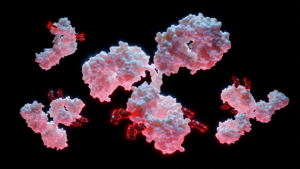 Antibody-drug conjugates (ADCs) consist of an antibody attached to a chemotherapy drug that delivers chemotherapy only where it is needed, limiting unwanted side effects. ADCs work by combining the ability of antibodies to target cancer cells with the ability of chemotherapy drugs to kill cancer cells.
Antibody-drug conjugates (ADCs) consist of an antibody attached to a chemotherapy drug that delivers chemotherapy only where it is needed, limiting unwanted side effects. ADCs work by combining the ability of antibodies to target cancer cells with the ability of chemotherapy drugs to kill cancer cells.
Three ADCs are approved for MBC: trastuzumab emtansine (Kadcyla®, T-DM1) for HER2+ MBC, trastuzumab deruxtecan (Enhertu®, T-DXd) for HER2+ and HER2-low MBC, and sacituzumab govitecan (Trodelvy®, SG) for hormone receptor-positive MBC and triple-negative MBC.
This month, we are highlighting a new experimental ADC called datopotamab deruxtecan (Dato-DXd), which, like Trodelvy®, targets a molecule called TROP2. TROP2 is found in over 75% of breast cancers. Dato-DXd is not yet FDA approved and is being tested in clinical trials in people with hormone receptor-positive, HER2-negative MBC and triple-negative MBC.
Read below for general information about how ADCs work and for research news about Dato-DXd.
About ADCs
Dato-DXd for Triple-Negative MBC
- Peter Schmid, MD, PhD (video): The BEGONIA trial: Dato-DXd plus immunotherapy provides a strong response in triple-negative MBC
Dato-DXd for Hormone Receptor-Positive MBC
- Hope Rugo, MD (video): The TROPION-Breast01 trial: Dato-DXd plus chemotherapy improves progression-free survival in people with hormone receptor-positive, HER2-negative MBC (discussion about drug at 0:16; discussion about safety and tolerance at 3:37)
- Breastcancer.org: Dato-DXd provides longer progression-free survival than chemotherapy in people with hormone receptor-positive, HER2-negative MBC
Clinical Trials
- Metastatic Trial Search: MBC Trials That Include ADCs
- Solid Tumor Trials: Use Search Term “ADC” to Find Trials That Include ADCs
Last Modified on February 29, 2024
